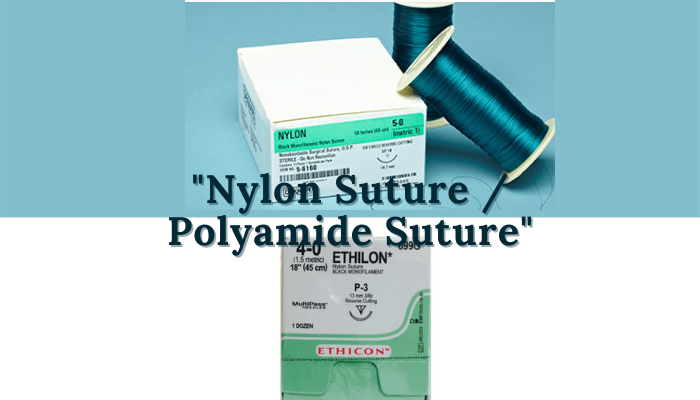Composition
Nylon suture is also known as polyamide suture which is composed of long-chain aliphatic polymers Nylon 6 and Nylon 6, 6 (hexamethylenediamine and adipic acid). It is 100% homo polymer obtained from polymerization of caprolactum which has 6 carbons so also known as Nylon – 6 or Polyamide – 6.
Characteristics
Nylon or polyamide suture is a nonabsorbable, sterile synthetic suture and is available as plain monofilament or braided multifilament in different sizes. Multifilament nylon has capillary action. It has good handling characteristics. But has high suture memory somewhat stiff to handle in larger sizes with relatively poor knot security. It has lesser plasticity and easier to handle in comparison to polypropylene sutures.
Monofilament nylon suture has smooth finish and lacks capillary action which does not support bacterial growth.
Uniform elasticity of nylon supports in the areas with small movements and results in a cosmetic effect.
Tensile strength
A polyamide suture has excellent tensile strength. It loses 30% of tensile strength (rupture of chemical links by hydrolytic action) within 2 years of implantation or up to 20% per year. It offers prolonged tensile strength in the infected areas. Nylon suture should be avoided in the areas where permanent retention of tensile strength is desired.
Knot security
Nylon has excellent knot tying characteristics. At least 4 throws are needed to secure a square knot and additional throws (5 on beginning of knot and 6 on ending of the knot) are necessary.
Tissue reaction
Nylon suture biologically is inert and stimulates minimal tissue reaction (grade-0). It may cause transitory local irritation due to inflammatory foreign body response. It has lesser or low tissue drag and does not adhere to the tissue.
Absorption
Nylon sutures are not absorbed. Nylon/Polyamide sutures are wrinkle proof and highly resistant to the abrasion and chemicals like alkalis and acids. They remain unaffected by blood, or body enzymes. Gradually it is encapsulated by the fibrous connective tissue.
Indications
Nylon suture is being used in human and veterinary surgery. Monofilament nylon suture can be used for closing cutaneous wounds, general soft tissue approximation/ligation, cardiovascular surgeries (not recommended for attachment of artificial prosthesis), ophthalmic surgeries (Cataract, Corneal, Trabeculectomy, Keratoplasty Surgeries), orthopedic surgeries, microsurgeries, plastic surgeries, dental surgeries, ligament / tendon repair and neurological procedures.
Contraindications
Use of nylon sutures is contraindicated in a history of known hypersensitivity, circulatory system and central nervous system. Nylon is not used within serous or synovial cavity because cut sharp ends can cause trauma due to friction. But zero tissue adherence makes them best choice for skin / subcuticular closure.
Colour and Sizes
They are dyed black (Plastic surgery and Ophthalmic surgery) / blue or green (in General surgery, Skin closure, Plastic surgery, Gastrointestinal surgery, Gynaecology and Obstetrics, Orthopaedics) to enhance visibility in the tissue (not coated). Also comes in undyed / clear form. Available in various lengths and gauze sizes (USP 2 to 11-0) with needles of different shapes (Round bodied, cutting edge/reverse cutting, taper point, straight, blunt point), sizes and lengths.
Storage
Resterilization, reuse and reprocessing is not recommended. It can be stored at 10oC-35°C in dry conditions. They are sterilized with ethylene oxide with a shelf life upto 5 years. In case of unsterilized spools repeated and prolonged sterilization must be avoided to maintain superior performance.
Examples
Ethilon, Dermalon, Surgilon, Nurolon, Nylene, Unilon, Linex, Hilon
Fig: Ethilon nylon suture black mono filament by Ethicon
Fig: Nylon/polyamide Suture by Teleflex
FAQs
Nylon / Polyamide suture is synthetic monofilament non-absorbable, sterile surgical suture composed of long-chain aliphatic polymers Nylon 6 and Nylon 6, 6 (hexamethylenediamine and adipic acid).
Nylon sutures are used for closing cutaneous wounds, general soft tissue approximation/ligation, cardiovascular surgeries (not recommended for attachment of artificial prosthesis), ophthalmic surgeries, orthopaedic surgeries, microsurgeries, plastic surgeries, dental surgeries, ligament / tendon repair and neurological procedures.
Nylon / polyamide suture are non-absorbable in nature. A few examples are – Ethilon, Dermalon, Surgilon, Nurolon, Nylene, Unilon, Linex, Hilon.
Yes. Ethilon is a brand name for polyamide or nylon sutures. It is manufactured by Ethicon.
No. Nylon suture is nonabsorbable in nature. Nylon suture material is nonabsorbent and strong and has a high degree of elasticity.
Yes. Nylon suture for skin closure are popular choice.
